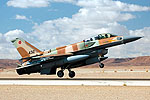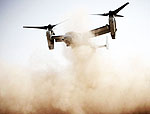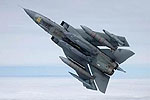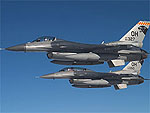Could Israel bomb Iran?
In a recent paper in the IFRI's Politique Etrangere, Scholar and expert Samy Cohen explains why a pre-emptive strike against Iran is unlikely for three reasons:
1st: The assessment of the Iranian Threat. Two schools are debating in Israel over the Iranian threat. According to the first, Iran would not hesitate to “wipe Israel off the map”, without fearing nuclear retaliation because their ideology renders them immune to normal deterrence. The second school, for its part, considers that Iran enjoys an influence momentum in the Middle East and has no interest in waging a nuclear war on ideological grounds. These experts say that Iranians are a “clever and rational people”. Hostile speeches against Israel are in fact designed to numb the fears of Arabic leaders by pointing the future bomb exclusively toward Israel. This second school also stresses that Iran is far more concerned about eastern nuclear neighbours: China, India and Pakistan. If it were to fall in the hands of the Taliban, nuclear Pakistan is a nightmare much worse than Israel. Even if this view can not be endorsed publicly, this second school is gathering more audience among military and strategist circles.
The 2nd reason the capacity of Israel Air Force. It has been studied by Abdullah Toukan and Anthony Cordesman for the Center for Strategic and International Studies in Washington and the conclusions can be found in Haaretz. Firstly, Israel does not know better than other western agencies how much sites are working on Iranian nuclear program. If the known sites are destroyed, Iran could switch to a fully secret program nobody could watch.
Also, the military operation remains practically possible but very complicated. According to Toukan and Cordesman, 90 airplanes (all 25 F-15Es in the IAF inventory and another 65 F-16I/Cs) would have to fly over Syria and be refulled en route and on the way back. In other words, surprise is impossible.
On site they would face heavy anti-aircraft defences: batteries of Hawk, SA-5 and SA-2 surface-to-air missiles, SA-7, SA-15, Rapier, Crotale and Stinger anti-aircraft missiles and eventually 1,700 anti-aircraft guns. Israel is also not sure if the Russian have already sold their S-300V system to the Iranians, in which case IAF have to expect to loose about 25% of the airplanes. One has to keep in mind that every captured pilot would join the fate of Gilad Shalit with sorrow families and pressure of public opinion.
Unlike open-air Osirak facilities, Iranian nuclear sites are heavily buried deep under the ground and protected by thick concrete walls. Pilots would have to be extremely precise and use special bombs.
Ecological and humanitarian consequences also have to be kept in mind. Destroying the Bushehr reactor means being responsible for the instant dying of thousands of iranians and the cancers of hundreds of thousands. Eventually “most definitely Bahrain, Qatar and the UAE will be heavily affected by the radionuclides."
Even in the best scenario, an Israeli strike would be a “half success”, not destroying all the sites and only highlighting the limitations of the IAF to enemy countries. Whatever the outcome, Israel would have to face retaliation from Iran, Hezbollah and Hamas: wave of suicide bombers and a rain of and Shahab III ballistic missiles and Katioucha’s rockets.
The third and main argument is the attitude of the United States. Israelis expert were certain that George W Bush would never accept a Nuclear Iran and give them a green light for a pre-emptive strike. However, by the end of its mandate, Bush feared retaliation from Iran against american bases in Irak and Afghanistan and refused his consent. Even with casting aside the current diplomatic crisis between Israel and the US, Obama is still subjected to the same strategic imperatives. Above all, Israel has a vital need for good relations with the US and even more in the case of a nuclear Iran
Experts are realistic but remains extremely concerned about loosing the Nuclear regional monopoly. This change is huge and will require to rethink the whole Israeli military doctrine, and far beyond. A poll from the Tel Aviv University shows that 23% would consider leaving Israel in the case of a Nuclear Iran.
Israel has other cards to play. Threatening to strike Iran is also a way of placing the US under pressure to make sure Iran is one of their priorities. Also some recent “inexplicable” issues in the Iranian program could be explained by undercover activities and secret operations. Israel can also choose to get out of the “ambiguity policy” and to issue an official deterrence doctrine. Eventually, it can negotiate the protection of the US nuclear umbrella in exchange of not attacking Iran. US would have no reason to refuse it and this could serve as a strong guarantee for public opinion.
traducción:
¿Podría Israel bombardear Irán?
En un artículo reciente en el IFRI Politique de Etrangére, sabio y experto Samy Cohen explica que un ataque preventivo contra Irán es poco probable, por tres razones:
1: La evaluación de la amenaza iraní. Dos escuelas se debate en Israel sobre la amenaza iraní. Según la primera, Irán no dudaría en "borrar a Israel del mapa", sin temor a una represalia nuclear porque su ideología les hace inmune a la disuasión normal. La segunda escuela, por su parte, considera que Irán goza de un impulso influencia en Oriente Medio y no tiene ningún interés en la realización de una guerra nuclear por motivos ideológicos. Estos expertos dicen que los iraníes son un pueblo "inteligente y racional". discursos hostiles contra Israel son en realidad el de adormecer los temores de los líderes árabes, señalando que la bomba futuro exclusivamente a Israel. Esta segunda escuela también hace hincapié en que Irán está mucho más preocupado por el este de vecinos nucleares: China, India y Pakistán. Si fuera a caer en manos de los talibanes, nuclear de Pakistán es una pesadilla mucho peor que Israel. Aunque este punto de vista, no puede acogerse al público, esta segunda escuela está reuniendo a más audiencia entre los círculos militares y de estrategia.
La razón por la 2 ª de la capacidad de Israel de la Fuerza Aérea. Ha sido estudiado por Abdullah Toukan y Anthony Cordesman del Centro para Estudios Estratégicos e Internacionales en Washington y las conclusiones se pueden encontrar en Haaretz. En primer lugar, Israel no lo sabe mejor que otras agencias occidentales la cantidad de sitios están trabajando sobre el programa nuclear iraní. Si los sitios más conocidos son destruidos, Irán podría cambiar a un programa totalmente secreto que nadie podía mirar.
Además, la operación militar se mantiene prácticamente posible, pero muy complicado. Según Toukan y Cordesman, 90 aviones (a los 25 F-15E en el inventario de la FAI y otros 65 F-16I/Cs) tendrían que volar sobre Siria y se refulled en ruta y en el camino de regreso. En otras palabras, la sorpresa es imposible.
En el sitio se enfrentarán a fuertes defensas antiaéreas: baterías de Halcón, SA-5 y los misiles SA-2-superficie-aire SA-7, SA-15, pinzas, Crotale y misiles Stinger antiaéreos y anti finalmente 1.700 aviones armas. Israel tampoco es seguro si el ruso ya han vendido su S-300V sistema para los iraníes, en cuyo caso la FIA tiene que esperar a perder cerca del 25% de los aviones. Hay que tener en cuenta que todos los pilotos capturados se uniría el destino de Gilad Shalit con las familias el dolor y la presión de la opinión pública.
A diferencia de las instalaciones de Osirak al aire libre, sitios nucleares iraníes están muy enterradas bajo tierra y protegido por gruesos muros de hormigón. Los pilotos tendrían que ser extremadamente preciso y el uso de bombas especiales.
Consecuencias ecológicas y humanitarias también tienen que tenerse en cuenta. La destrucción del reactor de Bushehr significa ser responsable de la muerte instantánea de miles de iraníes y los cánceres de cientos de miles. Finalmente, "definitivamente Bahrein, Qatar y los Emiratos Árabes Unidos será muy afectado por los radionucleidos."
Incluso en el mejor de los casos, un ataque israelí sería un éxito "la mitad", no en destruir todos los sitios y sólo destacar las limitaciones de la IAF a los países enemigos. Cualquiera sea el resultado, Israel tendría que enfrentar represalias por parte de Irán, Hezbolá y Hamas: ola de atentados suicidas y una lluvia de misiles Shahab III y balísticos y cohetes de Katioucha.
El tercer argumento y principal es la actitud de los Estados Unidos. expertos israelíes estaban seguros de que George W Bush nunca aceptaría un Irán nuclear y darles una luz verde para un ataque preventivo. Sin embargo, al final de su mandato, Bush temía represalias por parte de Irán contra las bases estadounidenses en Irak y Afganistán y se negó su consentimiento. Incluso dejando de lado con la actual crisis diplomática entre Israel y los EE.UU., Obama sigue siendo sometido a los imperativos estratégicos misma. Por encima de todo, Israel tiene una necesidad vital para las buenas relaciones con los EE.UU. y más aún en el caso de un Irán nuclear
Los expertos son realistas, pero sigue muy preocupado por perder el monopolio nuclear regional. Este cambio es enorme y requiere repensar toda la doctrina militar israelí, y mucho más allá. Una encuesta de la Universidad de Tel Aviv demuestra que el 23% consideraría dejar Israel en el caso de un Irán nuclear.
Israel tiene otras cartas para jugar. Amenaza con atacar a Irán es también una manera de colocar los EE.UU. bajo presión para asegurarse de que Irán es una de sus prioridades. También algunos recientes "inexplicables" las cuestiones del programa iraní podría ser explicado por las actividades encubiertas y operaciones secretas. Israel también puede optar por salir de la política de "ambigüedad" y la expedición de una doctrina de disuasión oficial. Eventualmente, puede negociar la protección del paraguas nuclear de EE.UU. a cambio de no atacar Irán. EE.UU. tendría ninguna razón para rechazarlo, lo que podría servir como una sólida garantía para la opinión pública.
slds,
moises














